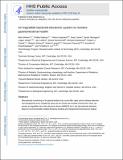| dc.contributor.author | Mimee, Mark Kyle | |
| dc.contributor.author | Nadeau, Phillip | |
| dc.contributor.author | Hayward, Alison M | |
| dc.contributor.author | Carim, Sean | |
| dc.contributor.author | Flanagan, Sarah | |
| dc.contributor.author | Jerger, Logan Andrew | |
| dc.contributor.author | Collins, Joy E | |
| dc.contributor.author | McDonnell, Shane | |
| dc.contributor.author | Swartwout, Richard M | |
| dc.contributor.author | Citorik, Robert James | |
| dc.contributor.author | Bulovic, Vladimir | |
| dc.contributor.author | Langer, Robert S | |
| dc.contributor.author | Traverso, Carlo Giovanni | |
| dc.contributor.author | Chandrakasan, Anantha P | |
| dc.contributor.author | Lu, Timothy K | |
| dc.date.accessioned | 2020-11-10T21:19:25Z | |
| dc.date.available | 2020-11-10T21:19:25Z | |
| dc.date.issued | 2018-05 | |
| dc.date.submitted | 2018-01 | |
| dc.identifier.issn | 0036-8075 | |
| dc.identifier.issn | 1095-9203 | |
| dc.identifier.uri | https://hdl.handle.net/1721.1/128441 | |
| dc.description.abstract | Biomolecular monitoring in the gastrointestinal tract could offer rapid, precise disease detection and management but is impeded by access to the remote and complex environment. Here, we present an ingestible micro-bio-electronic device (IMBED) for in situ biomolecular detection based on environmentally resilient biosensor bacteria and miniaturized luminescence readout electronics that wirelessly communicate with an external device. As a proof of concept, we engineer heme-sensitive probiotic biosensors and demonstrate accurate diagnosis of gastrointestinal bleeding in swine. Additionally, we integrate alternative biosensors to demonstrate modularity and extensibility of the detection platform. IMBEDs enable new opportunities for gastrointestinal biomarker discovery and could transform the management and diagnosis of gastrointestinal disease. | en_US |
| dc.description.sponsorship | Office of Naval Research (Grant N00014-13-1-0424) | en_US |
| dc.description.sponsorship | National Institutes of Health (Grant EB-000244) | en_US |
| dc.language.iso | en | |
| dc.publisher | American Association for the Advancement of Science (AAAS) | en_US |
| dc.relation.isversionof | http://dx.doi.org/10.1126/science.aas9315 | en_US |
| dc.rights | Creative Commons Attribution-Noncommercial-Share Alike | en_US |
| dc.rights.uri | http://creativecommons.org/licenses/by-nc-sa/4.0/ | en_US |
| dc.source | PMC | en_US |
| dc.title | An ingestible bacterial-electronic system to monitor gastrointestinal health | en_US |
| dc.type | Article | en_US |
| dc.identifier.citation | Mimee, Mark et al. "An ingestible bacterial-electronic system to monitor gastrointestinal health." Science 360, 6391 (May 2018): 915-918 © 2017 The Authors | en_US |
| dc.contributor.department | Massachusetts Institute of Technology. Synthetic Biology Center | en_US |
| dc.contributor.department | Massachusetts Institute of Technology. Department of Electrical Engineering and Computer Science | en_US |
| dc.contributor.department | Massachusetts Institute of Technology. Department of Chemical Engineering | en_US |
| dc.contributor.department | Massachusetts Institute of Technology. Department of Biological Engineering | en_US |
| dc.contributor.department | Koch Institute for Integrative Cancer Research at MIT | en_US |
| dc.relation.journal | Science | en_US |
| dc.eprint.version | Author's final manuscript | en_US |
| dc.type.uri | http://purl.org/eprint/type/JournalArticle | en_US |
| eprint.status | http://purl.org/eprint/status/PeerReviewed | en_US |
| dc.date.updated | 2019-06-12T17:20:41Z | |
| dspace.date.submission | 2019-06-12T17:20:42Z | |
| mit.journal.volume | 360 | en_US |
| mit.journal.issue | 6391 | en_US |
| mit.metadata.status | Complete | |
